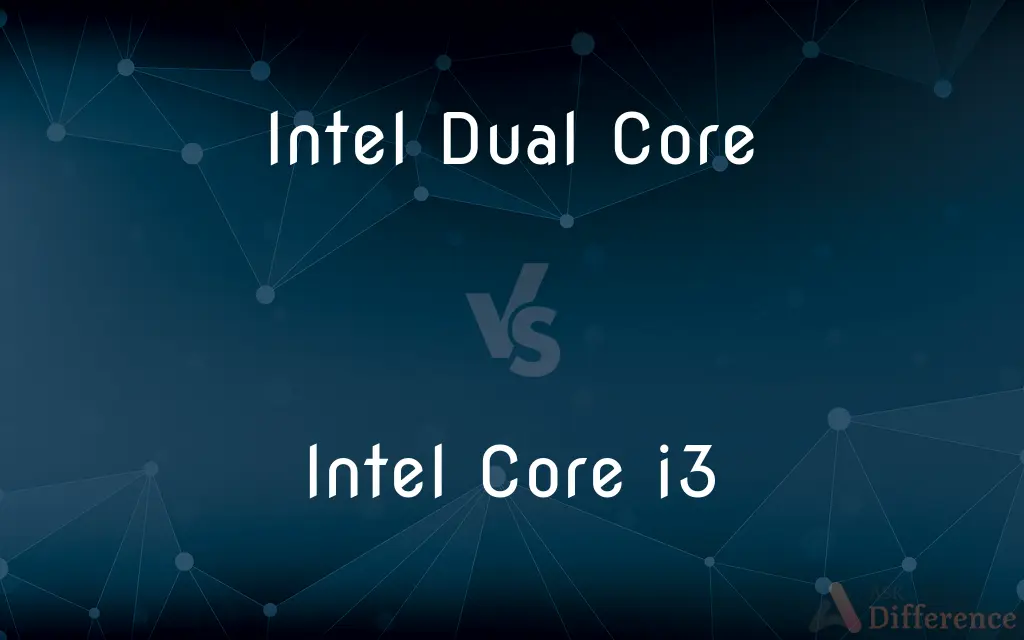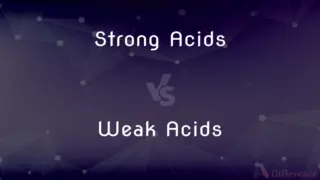Intel Dual Core vs. Intel Core i3 — What's the Difference?
By Tayyaba Rehman — Published on December 31, 2023
Intel Dual Core refers to CPUs with two processor cores, while Intel Core i3 is a specific family of processors, often with multiple cores and enhanced features.

Difference Between Intel Dual Core and Intel Core i3
Table of Contents
ADVERTISEMENT
Key Differences
Terminology and Origins: The term "Intel Dual Core" is a broad descriptor indicating that the CPU has two cores. This general term can refer to a range of Intel processors with two cores. In contrast, Intel Core i3 represents a specific family of processors under Intel's Core branding. It's a more defined term referring to a particular series.
Performance and Technology: While Intel Dual Core denotes a basic two-core structure, the Intel Core i3 processors often incorporate newer technologies, hyper-threading, and integrated graphics. This makes Intel Core i3 generally superior in performance to many older Dual Core processors.
Generational Differences: Intel Dual Core CPUs were more prevalent in earlier years when multi-core technology was in its infancy. On the other hand, Intel Core i3 processors belong to the more recent Core series, which also includes i5, i7, and i9 variants.
Market Positioning: Intel Dual Core processors were typically aimed at basic computing needs when they were released. Intel Core i3 processors, while still being entry-level in the Core series, often cater to a wider range of tasks, including light gaming and multimedia work, thanks to their enhanced features.
Evolution Over Time: Both terms have evolved. There have been multiple generations of Intel Core i3 processors since its introduction, with each generation bringing performance and technological enhancements. Intel Dual Core, meanwhile, is less frequently used in newer products as quad-core and above become standard.
ADVERTISEMENT
Comparison Chart
Definition
Generic term for 2-core CPUs.
A specific series of Intel's processors.
Technology & Performance
Basic dual-core technology.
Includes hyper-threading and integrated graphics.
Generational Presence
More common in earlier computing years.
Part of the recent Core series, with multiple gens.
Market Target
Basic computing tasks.
Wide range, from basic tasks to light gaming.
Evolution
Less common in newer product lines.
Continuously updated with new generations.
Compare with Definitions
Intel Dual Core
CPUs designed for basic multitasking.
The Intel Dual Core handled word processing and emails efficiently.
Intel Core i3
Represents Intel's modern computing solutions.
Newer laptops often feature the Intel Core i3 for balanced performance.
Intel Dual Core
Less advanced compared to Intel's i-series.
For gaming, one might prefer the i-series over the Intel Dual Core.
Intel Core i3
Has multiple generations, each with improvements.
The 10th generation Intel Core i3 has notable enhancements over its predecessors.
Intel Dual Core
A processor with two cores from Intel.
The Intel Dual Core was sufficient for my daily browsing tasks.
Intel Core i3
An entry-level processor in Intel's Core series.
The Intel Core i3 is ideal for budget PCs and laptops.
Intel Dual Core
Represents earlier multi-core technology from Intel.
My old laptop with an Intel Dual Core served me well for years.
Intel Core i3
Positioned above Intel Dual Core in performance.
For video editing, I'd pick an Intel Core i3 over an older Intel Dual Core.
Intel Dual Core
Intel's foray into the multi-core computing world.
The introduction of Intel Dual Core marked a step up from single-core processors.
Intel Core i3
Offers hyper-threading and integrated graphics.
With the Intel Core i3, I could play some light games without a dedicated GPU.
Common Curiosities
Is Intel Core i3 better than Intel Dual Core?
Generally, Intel Core i3 offers enhanced features and performance compared to older Intel Dual Core processors.
Does Intel Core i3 have integrated graphics?
Yes, Intel Core i3 processors often come with integrated graphics.
Are all Intel Core i3 processors dual-core?
No, while early Intel Core i3 CPUs were dual-core, newer generations can have more cores.
What does Intel Dual Core signify?
Intel Dual Core refers to CPUs with two processor cores from Intel.
Which is more recent: Intel Dual Core or Intel Core i3?
Intel Core i3 is more recent and is continuously updated, while Intel Dual Core refers to older models.
Can Intel Dual Core handle gaming?
While some older games might run on Intel Dual Core, modern titles may require more power, like an Intel Core i3.
Was Intel Dual Core one of the first multi-core processors?
Intel Dual Core was among Intel's initial forays into multi-core CPUs.
Can I upgrade from Intel Dual Core to Intel Core i3?
Upgrading depends on the motherboard compatibility, but many users have moved from Intel Dual Core to newer CPUs like Intel Core i3.
How does Intel Dual Core compare to quad-core processors?
Intel Dual Core has two cores, while quad-core processors have four, typically offering better multitasking.
Is Intel Core i3 suitable for multitasking?
Yes, Intel Core i3 is designed for efficient multitasking with its cores and hyper-threading.
Were Intel Dual Core processors popular in their time?
Yes, Intel Dual Core processors were prevalent during their release, providing an upgrade from single-core CPUs.
How does Intel Core i3 fare against other i-series processors?
Intel Core i3 is entry-level, with i5, i7, and i9 offering progressively better performance and features.
Is Intel Dual Core still in production?
Intel has shifted focus to its i-series and other newer architectures, so Intel Dual Core models are less common now.
What kind of tasks is Intel Core i3 ideal for?
Intel Core i3 is great for daily computing, light gaming, multimedia tasks, and more.
Are there different generations of Intel Core i3?
Absolutely, there are multiple generations of Intel Core i3, each bringing performance and technological improvements.
Share Your Discovery

Previous Comparison
White Corn vs. Yellow Corn
Next Comparison
Strong Acids vs. Weak AcidsAuthor Spotlight
Written by
Tayyaba RehmanTayyaba Rehman is a distinguished writer, currently serving as a primary contributor to askdifference.com. As a researcher in semantics and etymology, Tayyaba's passion for the complexity of languages and their distinctions has found a perfect home on the platform. Tayyaba delves into the intricacies of language, distinguishing between commonly confused words and phrases, thereby providing clarity for readers worldwide.











































